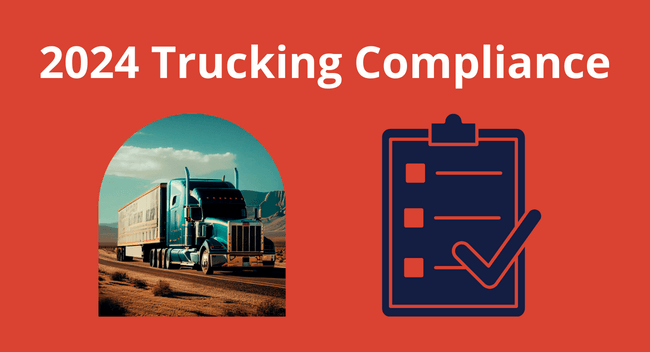
Navigating the Road Ahead: Key USDOT Compliance Considerations for Carriers in 2024

Trucking companies and owner-operators of commercial motor vehicle fleets face unique challenges regarding transportation compliance with the U.S. Department of Transportation (USDOT) and the Federal Motor Carrier Safety Administration (FMCSA).
With constantly changing USDOT and FMCSA regulations and the need for efficient operations, staying on top of compliance is crucial for a successful business in the trucking industry.
However, for trucking business carriers that are new to the trade or require assistance, it may be prudent to avail compliance services from trusted providers such as DOT Compliance Group.
DOT Compliance Group is a trucking compliance services provider in the US. We offer comprehensive USDOT safety compliance services for truckers and owner-operators to ensure that every trucking company is operating safely and efficiently on the road.
Electronic Logging Devices (ELDs)
Electronic logging devices (ELDs) are required for most commercial motor vehicles (CMVs) to record hours of service (HOS).
These devices are mandated by the FMCSA and serve as a vital tool to improve safety and monitor drivers’ compliance with HOS regulations.
Ensuring ELD Compliance
To ensure compliance with ELD regulations, carriers must-have devices that meet FMCSA standards and are registered on the FMCSA’s list of certified ELDs.
Carriers should also regularly review their drivers’ logs and require them to certify their accuracy.
Updating ELD Software
ELD software must be updated regularly to ensure it meets compliance requirements and functions properly.
Carriers should also be aware of any ELD vendor updates or recalls and take immediate action to address any issues.
Driver Training and ELD Issues
Carriers must provide adequate training for their drivers on how to use ELDs correctly, including troubleshooting common issues such as technical malfunctions or data transfer errors.
Hours of Service (HOS) Regulations
All commercial motor vehicle drivers are required to record and log their hours of service (HOS) to ensure they are complying with federal regulations.
HOS regulations include daily driving limits, mandatory rest breaks, and maximum hours worked per week.
Staying informed about HOS rule changes
One of the challenges trucking businesses face is staying up-to-date with changing HOS regulations.
It is essential to ensure that drivers are trained and informed about any rule changes and comply accordingly.
As part of our transportation compliance services, DOT Compliance Group closely monitors regulatory updates and can help carriers stay ahead of any changes in HOS rules.
Impact of HOS regulations on scheduling
HOS regulations can greatly affect trucking business schedules and operations, especially for long-haul carriers.
Carriers must manage their drivers’ schedules effectively to comply with HOS regulations while meeting delivery deadlines.
Importance of HOS compliance for safety
Complying with HOS regulations is crucial for the safety of both drivers and other motorists on the road.
Fatigued driving is a leading cause of truck accidents, and HOS regulations aim to prevent drivers from operating their vehicles while fatigued.
DOT Compliance Group offers USDOT compliance services to help carriers manage and monitor their drivers’ compliance with HOS regulations, ensuring safety on the road.

Drug and Alcohol Testing
Drug and alcohol testing is a necessary screening process for all employees, but more so for trucking companies. The FMCSA has strict requirements for drug and alcohol testing of commercial drivers to ensure the safety of everyone on the road.
As such, there are myriads of drug and alcohol testing program regulations that carriers must comply with.
Types of testing required
Carriers must comply with all types of drug and alcohol testing required by the FMCSA, including the following:
- Random drug and alcohol testing
- Pre-employment drug testing
- Post-accident drug and alcohol testing
- Return-to-duty testing
- Reasonable suspicion
- Follow-up
USDOT requirements for drug and alcohol testing
The FMCSA has strict guidelines for drug and alcohol testing, including the use of approved laboratories and certified medical review officers (MRO).
Carriers must also maintain accurate records of all tests and results and follow proper procedures for reporting positive results.
DOT Compliance Group can help carriers manage their drug and alcohol testing programs by providing support in maintaining compliance with FMCSA regulations.
This also includes guidance for drug and alcohol supervisor training and assistance with setting up a drug and alcohol testing program.
Vehicle Maintenance
Vehicle maintenance is an essential transportation compliance requirement for ensuring the safety and reliability of commercial motor vehicles on the road.
FMCSA and USDOT regulations include specific requirements for pre-trip and post-trip inspections, record-keeping, and regular vehicle maintenance schedules.
Establishing a maintenance schedule
Carriers must have a regular maintenance schedule for all their vehicles, including routine inspections and necessary repairs.
This helps ensure that commercial motor vehicles are always in good working condition and compliant with the FMCSA and USDOT regulations.
Keeping detailed maintenance records
Maintaining accurate and up-to-date vehicle maintenance records is crucial for compliance purposes. This includes safety performance history records, inspection and repair records, and a maintenance schedule.
These records can help trucking companies track when inspections and repairs were performed and identify any recurring issues that may need to be addressed.
Preventing breakdowns and safety compliance
Regular vehicle maintenance helps prevent unexpected breakdowns on the road, which can lead to accidents and violations.
At DOT Compliance Group, we can help you establish a comprehensive vehicle maintenance program and provide support in maintaining detailed records to stay compliant with regulations.
HazMat Transportation
.
Additional compliance requirements must be considered for trucking companies that transport hazardous materials (HazMat) and dangerous goods.
The USDOT Pipeline and Hazardous Materials Safety Administration (PHMSA) has strict regulations, such as proper labeling, packaging, and driver and employee training.
Permits and training for hazardous materials
Carriers must have a Hazardous Materials Safety Permit to transport certain types and quantities of hazardous materials. To obtain this permit, drivers must undergo specialized training and pass a written test.
It is essential for carriers to ensure that all employees involved in HazMat transportation receive proper training on handling, labeling, packaging, and emergency response procedures.
Documentation for HazMat compliance
The PHMSA also requires carriers to maintain detailed records of all transported hazardous materials, including shipping papers, vehicle placards, and emergency response information.
These documents must be readily available for inspection and maintenance requirements at all times. DOT Compliance Group can assist carriers in maintaining accurate documentation and staying compliant with HazMat regulations.
Safety considerations in HazMat transportation
Transporting hazardous materials comes with unique safety hazards, and carriers must have proper protocols to prevent accidents and spills.
These include conducting regular vehicle inspections, ensuring proper handling and labeling of hazardous materials, and having a detailed emergency response plan in case of an incident.
Safety Ratings
A trucking company’s safety rating can significantly impact its operations and reputation.
USDOT safety compliance for this aspect includes maintaining a satisfactory safety rating and addressing any violations or issues that may affect it.
Monitoring safety ratings
The Safety and Fitness Electronic Records (SAFER) System allows carriers to view their safety ratings, compliance data, and potential hazards or violations.
Carriers should regularly monitor their ratings and address any issues to maintain a satisfactory rating.
Addressing violations and improving ratings
If a carrier receives an unsatisfactory safety rating, they must take immediate action to address any violations or deficiencies. This may include implementing corrective measures, undergoing additional training, doing safety audits, or facing penalties and fines.
Proactively addressing violations can help improve a carrier’s safety rating and prevent future issues.
Benefits of a favorable safety rating
A favorable safety rating demonstrates to potential clients that the carrier is committed to compliance and prioritizing the safety of its operations.
At DOT Compliance Group, we can help you with your safety program and ensure your operations comply with regulations, leading to a positive safety rating. And, having a positive safety rating could save you money on insurance premiums.

Cybersecurity and Data Protection
With the implementation of electronic logging devices (ELDs) and other advanced technology in the trucking industry, data protection and cybersecurity have become essential compliance considerations.
Commercial motor carriers are required to have safeguards in place to protect sensitive data and prevent cyber threats. Regular training for employees on cybersecurity best practices is also crucial.
Protecting sensitive data
Carriers must protect sensitive data, such as drivers’ personal information and company financial records, from unauthorized access or cyber-attacks. This includes implementing firewalls, encryption methods, and secure password protocols.
Compliance with data protection laws
In addition to federal regulations, carriers must also comply with any state or local laws regarding data protection. This is especially important for carriers that engage in interstate commerce, as they must adhere to the data protection laws of each state they operate in.
Environmental Regulations
In addition to road safety standards, carriers must also comply with environmental regulations to minimize the environmental impact of their operations.
This includes proper disposal of hazardous materials, reducing emissions, and adhering to EPA regulations.
Staying updated on emissions standards
Carriers must stay up-to-date with changing emissions standards, such as the EPA’s Greenhouse Gas Emissions Standards for Heavy-Duty Trucks. This includes regular vehicle maintenance and potentially investing in newer, more fuel-efficient vehicles.
Adopting eco-friendly practices
Carriers can also implement eco-friendly practices to reduce their impact on the environment, such as using alternative fuels or implementing idle reduction technologies.
Reducing carbon footprint for compliance
Your carbon footprint can be a key factor in determining a carrier’s compliance with environmental regulations.
Driver Training and Certification
Commercial vehicle drivers must undergo proper training and certification to ensure they are qualified and knowledgeable about the trucking industry’s regulations and safety measures.
Investment in driver training programs
Carriers should invest in comprehensive driver training programs to ensure their drivers are knowledgeable about regulations and safety measures. This includes regular refresher courses and staying updated on any changes in regulations.
Ensuring drivers are well-trained and licensed
Proper licensing is crucial for commercial drivers, ensuring they are qualified to operate a heavy vehicle. Carriers must verify that all drivers hold a valid CDL and any necessary endorsements.
Compliance through driver education
Educating drivers on compliance is also crucial to maintaining safety and meeting regulatory standards. Drivers should receive training not only on regulations but also on their company’s policies and procedures to ensure they are operating in compliance with all requirements.
DOT Compliance Group: Your Trusted Trucking Compliance Services Provider
At DOT Compliance Group, we understand that compliance is not a one-time task, but an ongoing commitment. Our team stays up-to-date on all regulations and works closely with carriers to ensure they are always in compliance.
By partnering with DOT Compliance Group, carriers can focus on their core business while leaving the complex world of compliance to our specialists.
Our personalized approach and comprehensive services make us a trusted partner for all transportation and USDOT safety compliance needs.
Contact us today to get started!

Checklist
DOT Compliance Checklist for Carriers in 2024
- Ensure that Electronic Logging Devices (ELDs) comply with current regulations and regularly update software as needed.
- Train drivers on using ELDs properly and promptly address any ELD-related issues.
- Stay informed about potential changes and updates to Hours of Service (HOS) regulations and adjust scheduling and dispatching processes accordingly.
- Conduct regular drug and alcohol testing for drivers.
- Establish a comprehensive vehicle maintenance schedule and keep detailed records of all maintenance activities.
- If transporting hazardous materials, ensure that all necessary permits and training are in place, and maintain proper documentation.
- Monitor safety ratings regularly, address violations promptly, and work towards achieving a favorable safety rating.
- Implement robust cybersecurity measures to protect sensitive data and ensure compliance with data protection laws.
- Stay updated on environmental regulations.
- Invest in driver training and certification programs.
- Regularly review and update company policies and procedures to align with current compliance requirements.
- Record all compliance-related documentation, including ELD records, maintenance logs, and safety training records.
- Conduct internal audits or seek external compliance audits to identify and address any compliance gaps.
- Stay engaged with industry associations and regulatory agencies to stay informed about upcoming changes and compliance requirements.
- Continuously educate employees and drivers about the importance of compliance and safety.
- Develop a contingency plan for handling compliance violations, accidents, or unexpected events.
- Review and update your company’s safety and compliance handbook regularly.
- Maintain open lines of communication with employees, drivers, and regulatory authorities to address any compliance concerns or questions.
- Periodically assess the effectiveness of your compliance program and make improvements as needed.
- Partner with a professional compliance company, like DOT Compliance Group, to receive expert guidance and support in navigating compliance challenges.
Remember that compliance is an ongoing commitment, and this checklist should be used as a reference to ensure that your carrier operations meet the necessary regulatory standards throughout the year 2024 and beyond.
